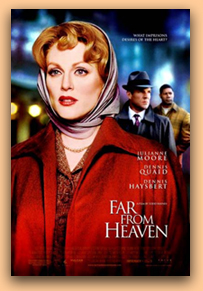
FEST2003
Far from Heaven
Todd Haynes, director
Review by Rada Djurica
"Far From Heaven" is a brave film in its content and its portrayal of a time period. Todd Haynes designed "Far From Heaven" as an homage to the work of 1950's director Douglas Sirk ("Written on the Wind"). The movie was nominated for many awards. What a jump for the director of "Velvet Goldmine."
Creating a 1950s melodrama today and hitting the point so
directly, in this adrenaline crazed era, might seem just a creative impulse.
"Far From Heaven" is not only set in the 1950's, it is shot
as if it was made in the 1950's, and it is a melodrama, which was common
for that era. There is one key difference: the politics of the 1950s would
never have allowed a movie about homosexuality, or about questioning middle
class Christian society. The movie is set in the heart of suburban Connecticut,
and it's about the lives of one couple, wrapped up in post-war prosperity.
Todd Haynes said of the film, "To impose the seeming innocence of
the '50s themes with those as mutually volatile as race and sexuality,
is to reveal how volatile those subjects remain today, and how much our
current climate of complacent stability has in common with that bygone
era."
In the colorful Fall of 1957, we see the perfect picture of a suburban
family in Connecticut. Their daily existence is characterized by carefully
observed family etiquette and social events. Cathy is a homemaker, wife
and mother. Frank is a working man who feeds his family, a husband and
a father. The couple have two small children, a boy and a girl. A black
maid and a gardener complete their perfect household.
Everything is perfect, until Frank starts acting strange. At work, he's seeing a man, and throughout the film, he's discovering his latent homosexuality. Cathy's perfect world starts to fall apart when she realizes that her perfect husband is gay. Not a rare thing for such a big country, but since it is happening in the '50s, it is really taboo.
Then, the relationship between her and her black gardener grows more intense. In that time, society was not ready for interracial couples. In parts of the country, black people had their own bars and a separate life. An upper class white woman should not be messing with her black gardener. The idyllic Fall and the beautiful surroundings, big house and everything, become a prison for a disappointed woman.
Julianne Moore had to work hard not to overact, not to let
the sentimentality of the part carry her away. Dennis Quaid has the toughest
job; he's got to keep up his family man façade, while letting it
crack open to reveal the bitter, broken man inside. He is burdened by
his betrayal and by the tug of his awakening homosexuality. The couple's
relationship in the family is uptight, so that the emotional depth is
concentrated in its cinematography, costumes and scores.
"Far From Heaven" is not so much a tribute as an attempt to
recapture the glory days of an earlier U.S. cinematic period. "Far
From Heaven" is still a sticky melodrama but would, if released in
1957, have been a bomb, shocking both critics and audiences with its language
and its subject (homosexuality and interracial romance).
Primarily, it features a family conflict with no easy answer. "Far From Heaven" portrays the relationship between Mr. and Mrs. Whitaker (Dennis Quaid and Julianne Moore), a picture of the perfect marriage, altered by Quaid's growing attraction to another man. The climax of the conflict in "Far From Heaven," like its characters, is a Technicolor surge of imagery, featuring lush dresses, autumn leaves and big flashy cars. The cinematography is superior, and the cheesy score of the ending fits in perfectly with the subject matter. The excellence of the technical aspects of the movie are balanced by the human aspects. It is obvious that Todd Haynes was very careful here.